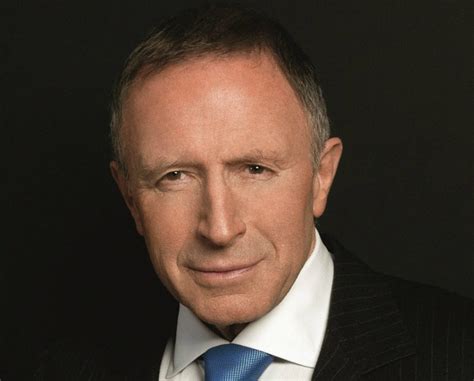Top 1200 Investment Quotes & Sayings - Page 3
Explore popular Investment quotes.
Last updated on December 22, 2024.
A rentier is an investor whose relationship to a company or enterprise is strictly limited to the ownership of financial wealth (such as stocks or bonds) and the receipt of income on that wealth (such as dividends or interest). The financial system performs dismally at its advertised task, that of efficiently directing society's savings towards their optimal investment pursuits. The system is stupefyingly expensive, gives terrible signals for the allocation of capital, and has surprisingly little to do with real investment.
It is our argument that a sufficiently low price can turn a security of mediocre quality into a sound investment opportunity - provided that the buyer is informed and experienced and he practices adequate diversification. For, if the price is low enough to create a substantial margin of safety, the security thereby meets our criterion of investment.
Ben's Mr. Market allegory may seem out-of-date in today's investment world, in which most professionals and academicians talk of efficient markets, dynamic hedging and betas. Their interest in such matters is understandable, since techniques shrouded in mystery clearly have value to the purveyor of investment advice. After all, what witch doctor has ever achieved fame and fortune by simply advising 'Take two aspirins'?
The question is not about whether it will work or not. It's how quickly we can pull it off. Structural change will happen. When economies grow, there comes a time when you cannot rely on investment alone. We had that. The return on investment is becoming less and less. So we have to change. The old model doesn't work anymore. It's a question of speed.
We welcome private investment, but any company or national firm will be a partner of a venture where the result will go mainly to the Bolivian people. Of course, any investor is entitled to recover their investment and take profits. But be assured that these new functions with our partners will also be reinvested in our country for the benefit of the Bolivian people.
I think the reason why we got into such idiocy in investment management is best illustrated by a story that I tell about the guy who sold fishing tackle. I asked him, "My God, they're purple and green. Do fish really take these lures?" And he said, "Mister, I don't sell to fish." Investment managers are in the position of that fishing tackle salesman.
Government investment unlocks a huge amount of private sector activity, but the basic research that we put into IT work that led to the Internet and lots of great companies and jobs, the basic work we put into the health care sector, where it's over $30 billion a year in R&D that led the biotech and pharma jobs. And it creates jobs and it creates new technologies that will be productized. But the government has to prime the pump here. The basic ideas, as in those other industries, start with government investment.
Education is the lifeline of the city of Boston in a lot of ways, as far as preparing and educating young people for the future. So when we think about that - I would love to have the $25 million dollar investment we made up to close the gap on charter schools. I'd love to make that investment in a different part of the school system if we could. The money that we're trying to adjust on transportation, I would love to, if we can save money in transportation - that's not going to be a savings, that's going to come into the general fund, that's going to be reinvested in the school.
'Crowd folly', the tendency of humans, under some circumstances, to resemble lemmings, explains much foolish thinking of brilliant men and much foolish behavior - like investment management practices of many foundations represented here today. It is sad that today each institutional investor apparently fears most of all that its investment practices will be different from practices of the rest of the crowd.
When you look at this and where it's all going, the hardware business requires a lot of investment. It's very hard, it's very expensive, and ramping up hard on any given platform, whether it's a console or any kind of PC or mobile device, going into the hardware business requires a lot of investment.
I rang my friend Jim Wolfensohn, who was then running a private commercial bank in New York. I said, "Come up to Vancouver", and he did. I put my proposition to him. He said, "I think it could work." I said, "Will you help us?" He said, "Yes." So, I set aside senior people in our treasury and they worked with Wolfensohn and the investment sanctions were applied. And that's what brought the regime down. The last South African Finance Minister, Barend du Plessis, went on record as saying that it was the investment sanctions that put the final nail in the coffin of apartheid.
I think a 23-page ordinary comic is an investment for the artist, but if you're doing something 60 to 104 pages, that's a really big investment for an artist. So unless you've got someone who wants to pay you while you're doing it or up front, it's kind hard to get someone to do that with you, unless you're the artist yourself.
Below, we itemize some of the quite different lessons investors seem to have learned as of late 2009 - false lessons, we believe. To not only learn but also effectively implement investment lessons requires a disciplined, often contrary, and long-term-oriented investment approach. It requires a resolute focus on risk aversion rather than maximizing immediate returns, as well as an understanding of history, a sense of financial market cycles, and, at times, extraordinary patience.
Why can't the investment firm of I've Got More Than You'll Ever Have and I'm Laughing at You About It not build a highway or two if they think it might be a valuable investment? "Well, because then they own it and they can restrict who uses it!" And you think the government doesn't? (laughing) You talk about government owning and restricting people on things? The government restricts what you can say, they restrict what you can watch, they restrict now what you can eat, they restrict what your health care is gonna be, and you're worried about them restricting roads!
A new product, technology, or innovation - such as Bitcoin - has the potential to give rise both to frauds and high-risk investment opportunities. Potential investors can be easily enticed with the promise of high returns in a new investment space and also may be less skeptical when assessing something novel, new, and cutting-edge.
However little president Obama knows or cares about economics, he knows a lot about politics - and especially political rhetoric. 'High-speed rail' is simply another set of loft words to justify continued expansion of government spending. So are words like 'investment in education' or 'investment' in any number of other things, which serves the same political purpose.
The spectacle of modern investment markets has sometimes moved me towards the conclusion that to make the purchase of an investment permanent and indissoluble, like marriage, except by reason of death or other grave cause, might be a useful remedy for our contemporary evils. For this would force the investor to direct his mind to the long-term prospects and to those only.
We have worked to make our trade negotiations more transparent and to negotiate value-based agreements. We have listened to concerns, for example by carrying out a reform of the investment protection system and setting out to create a multilateral investment court. Our world is rapidly changing and this creates a multitude of concerns.
Don't try to buy art as an investment. Buy something you really love because you're going to have to look at it again tomorrow. And an investment can go up or down. Buy something you really adore, you really like, and you want to live with. And if you decide some years later you don't want to live with it anymore, sell it. Get out.
These results add up to perhaps the most important investment lesson of all that can be drawn from this week's market anniversaries: Predicting turns in the market is incredibly difficult to do consistently well. That means that, if your investment strategy going forward is dependent on your anticipating major market turning points, your chances of success are extremely low.
It's easy enough to predict that there will be conflict, but you place yourself in a maelstrom when you offer a view about the conflict, and I don't have an investment in one side or the other; I feel compassion for both sides. I've spent a fair amount of time in Gaza and Israel, done a lot of reporting and lived over there, and the tragedy is sometimes overwhelming. At the same time, America does have an investment in what happens.
One might think of investment managers as astronomers and CEOs as astronauts. The two roles are radically different with distinct personality traits. Like astronomers, investment managers tend to be introverted, skeptical, and very analytical. CEOs, like astronauts, are the exact opposite, typically being extroverts, optimists, and, well, leaders.
One of the most important analytic tools when assessing an investment is an intellectually advantaged disparate view. This includes knowing more and perceiving the situation better than others do. It is also critical to have a keen understanding of what the market expectations for any investment truly are. Thus, the process by which a disparate perception, when correct, becomes consensus should lead to meaningful profit. Understanding market expectation is at least as important as, and often different from fundamental knowledge.
The value of market esoterica to the consumer of investment advice is a different story. In my opinion, investment success will not be produced by arcane formulae, computer programs or signals flashed by the price behavior of stocks and markets. Rather an investor will succeed by coupling good business judgment with an ability to insulate his thoughts and behavior from the super-contagious emotions that swirl about the marketplace.
As a matter of fact 25% of our U.S. investment banking business comes out of our commercial bank. So it's a competitive advantage for both the investment bank - which gets a huge volume of business - and the commercial bank because the commercial bank can walk into a company and say, "Oh, if you need X, Y and Z in Japan or China, we can do that for you."
Getting the economy back on its feet is properly viewed as an investment in future prosperity. When businesses and consumers confront attractive investment opportunities, often the only way to seize them is by borrowing. The same is true for government. Contrary to the pronouncements of critics of economic stimulus, these investments will not impoverish our grandchildren. Continuing to allow the economy to languish in recession is the surest way to impoverish them.
The art of investment has one characteristic that is not generally appreciated. A creditable, if unspectacular, result can be achieved by the lay investor with a minimum of effort and capability; but to improve this easily attainable standard requires much application and more than a trace of wisdom. If you merely try to bring just a little extra knowledge and cleverness to bear upon your investment program, instead of realizing a little better than normal results, you may well find that you have done worse.
The Berkshire-style investors tend to be less diversified than other people. The academics have done a terrible disservice to intelligent investors by glorifying the idea of diversification. Because I just think the whole concept is literally almost insane. It emphasizes feeling good about not having your investment results depart very much from average investment results. But why would you get on the bandwagon like that if somebody didn't make you with a whip and a gun?
In investment management today, everybody wants not only to win, but to have a yearly outcome path that never diverges very much from a standard path except on the upside. Well, that is a very artificial, crazy construct. That's the equivalent in investment management to the custom of binding the feet of Chinese women
You have to understand your own psychology. You have to understand that human beings weren't really designed to invest. We have all these emotions that are appropriate responses if you're being chased by a tiger, but they're terrible responses if you've got a 30-year time horizon to think about investment or when you're trying to manage investment over 30 years.
Occasionally we are asked whether it would make sense to modify our investment strategy to perform better in today's financial climate. Our answer, as you might guess, is: No! It would be easyfor us to capitulate to the runaway bull market in growth and technology stocks. And foolhardy. And irresponsible. And unconscionable. It is always easiest to run with the herd; at times, it can take a deep reservoir of courage and conviction to stand apart from it. Yet distancing yourself from the crowd is an essential component of long-term investment success.
Historically Turkey hasn't had much success in attracting foreign investment. Slowly that is changing. There's a tradition of arbitrary decisions by government ministers and senior civil servants, which would ruin businesses from one day to the next, and which has tended to deter foreign investment. That's changing, and convergence with E.U. practices is a good thing in that it improves governance.
Rather, risk is a perception in each investor's mind that results from analysis of the probability and amount of potential loss from an investment. If an exploratory oil well proves to be a dry hole, it is called risky. If a bond defaults or a stock plunges in price, they are called risky. But if the well is a gusher, the bond matures on schedule, and the stock rallies strongly, can we say they weren't risky when the investment after it is concluded than was known when it was made.
When we were young, there weren't very many smart people in the investment world. You should have seen the people in the bank trust departments. Now, there are armies of smart people at private investment funds, etc . If there were a crisis now, there would be a lot more people with a lot of money ready to take advantage.
Bitcoins are not a real investment; they are bets inside a casino. If the price goes back up, don't be fooled. In the parlance of popping investment bubbles, it's something called a 'dead-cat bounce.' People who are desperate to keep the game going rush back in, hoping to bring the price back up, but it never lasts.
You are your greatest investment. The more you store in that mind of yours, the more you enrich your experience, the more people you meet, the more books you read, and the more places you visit, the greater is that investment in all that you are. Everything that you add to your peace of mind, and to your outlook upon life, is added capital that no one but yourself can dissipate.














































